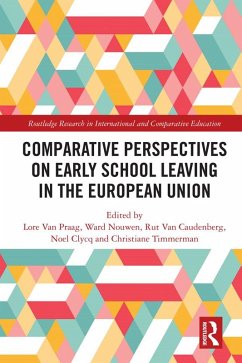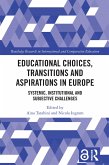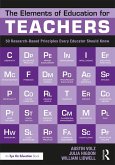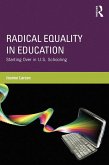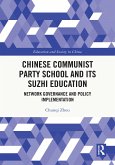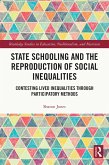Comparative Perspectives on Early School Leaving in the European Union (eBook, PDF)
Redaktion: Praag, Lore van; Timmerman, Christiane; Clycq, Noel; Caudenberg, Rut van; Nouwen, Ward
40,95 €
40,95 €
inkl. MwSt.
Sofort per Download lieferbar

20 °P sammeln
40,95 €
Als Download kaufen

40,95 €
inkl. MwSt.
Sofort per Download lieferbar

20 °P sammeln
Jetzt verschenken
Alle Infos zum eBook verschenken
40,95 €
inkl. MwSt.
Sofort per Download lieferbar
Alle Infos zum eBook verschenken

20 °P sammeln
Comparative Perspectives on Early School Leaving in the European Union (eBook, PDF)
Redaktion: Praag, Lore van; Timmerman, Christiane; Clycq, Noel; Caudenberg, Rut van; Nouwen, Ward
- Format: PDF
- Merkliste
- Auf die Merkliste
- Bewerten Bewerten
- Teilen
- Produkt teilen
- Produkterinnerung
- Produkterinnerung

Bitte loggen Sie sich zunächst in Ihr Kundenkonto ein oder registrieren Sie sich bei
bücher.de, um das eBook-Abo tolino select nutzen zu können.
Hier können Sie sich einloggen
Hier können Sie sich einloggen
Sie sind bereits eingeloggt. Klicken Sie auf 2. tolino select Abo, um fortzufahren.

Bitte loggen Sie sich zunächst in Ihr Kundenkonto ein oder registrieren Sie sich bei bücher.de, um das eBook-Abo tolino select nutzen zu können.
Early School Leaving in the European Union provides an analysis of early school leaving (ESL) in nine European Union countries, with a particular focus on young people who were previously enrolled in educational institutions inside and outside mainstream secondary education. The comparative approach employed by this volume adds to the existing body of knowledge on ESL and develops an understanding of how young people navigate through different educational systems.
- Geräte: PC
- mit Kopierschutz
- eBook Hilfe
- Größe: 1.32MB
Andere Kunden interessierten sich auch für
![Educational Choices, Transitions and Aspirations in Europe (eBook, PDF) Educational Choices, Transitions and Aspirations in Europe (eBook, PDF)]() Educational Choices, Transitions and Aspirations in Europe (eBook, PDF)42,95 €
Educational Choices, Transitions and Aspirations in Europe (eBook, PDF)42,95 €![The Elements of Education for Teachers (eBook, PDF) The Elements of Education for Teachers (eBook, PDF)]() Austin VolzThe Elements of Education for Teachers (eBook, PDF)30,95 €
Austin VolzThe Elements of Education for Teachers (eBook, PDF)30,95 €![Pedagogy and Learning with ICT (eBook, PDF) Pedagogy and Learning with ICT (eBook, PDF)]() Bridget SomekhPedagogy and Learning with ICT (eBook, PDF)31,95 €
Bridget SomekhPedagogy and Learning with ICT (eBook, PDF)31,95 €![Radical Equality in Education (eBook, PDF) Radical Equality in Education (eBook, PDF)]() Joanne LarsonRadical Equality in Education (eBook, PDF)33,95 €
Joanne LarsonRadical Equality in Education (eBook, PDF)33,95 €![Urban High Schools (eBook, PDF) Urban High Schools (eBook, PDF)]() Annette B. HemmingsUrban High Schools (eBook, PDF)33,95 €
Annette B. HemmingsUrban High Schools (eBook, PDF)33,95 €![Chinese Communist Party School and its Suzhi Education (eBook, PDF) Chinese Communist Party School and its Suzhi Education (eBook, PDF)]() Chunqi ZhouChinese Communist Party School and its Suzhi Education (eBook, PDF)40,95 €
Chunqi ZhouChinese Communist Party School and its Suzhi Education (eBook, PDF)40,95 €![State Schooling and the Reproduction of Social Inequalities (eBook, PDF) State Schooling and the Reproduction of Social Inequalities (eBook, PDF)]() Sharon JonesState Schooling and the Reproduction of Social Inequalities (eBook, PDF)42,95 €
Sharon JonesState Schooling and the Reproduction of Social Inequalities (eBook, PDF)42,95 €-
-
-
Early School Leaving in the European Union provides an analysis of early school leaving (ESL) in nine European Union countries, with a particular focus on young people who were previously enrolled in educational institutions inside and outside mainstream secondary education. The comparative approach employed by this volume adds to the existing body of knowledge on ESL and develops an understanding of how young people navigate through different educational systems.
Dieser Download kann aus rechtlichen Gründen nur mit Rechnungsadresse in A, B, BG, CY, CZ, D, DK, EW, E, FIN, F, GR, HR, H, IRL, I, LT, L, LR, M, NL, PL, P, R, S, SLO, SK ausgeliefert werden.
Produktdetails
- Produktdetails
- Verlag: Taylor & Francis eBooks
- Seitenzahl: 270
- Erscheinungstermin: 15. März 2018
- Englisch
- ISBN-13: 9781351691819
- Artikelnr.: 54171597
- Verlag: Taylor & Francis eBooks
- Seitenzahl: 270
- Erscheinungstermin: 15. März 2018
- Englisch
- ISBN-13: 9781351691819
- Artikelnr.: 54171597
- Herstellerkennzeichnung Die Herstellerinformationen sind derzeit nicht verfügbar.
Lore Van Praag, PhD Ghent University, is research coordinator at the Centre for Migration and Intercultural Studies (University of Antwerp) and project manager of the RESL.eu project. Her research interests focus on inequalities in education, tracking practices, ethnic minorities, early school leavers and humour. Ward Nouwen is a sociologist of education and a PhD researcher at the Centre for Migration and Intercultural Studies of the University of Antwerp. His main research topics are school segregation, educational tracking, early school leaving and work-based learning. Rut Van Caudenberg is a joint PhD candidate at the Centre for Migration and Intercultural Studies, University of Antwerp (Belgium) and the Department of Social and Cultural Anthropology, Universitat Autònoma de Barcelona (Spain). Her research focuses on urban youth's lived experiences of schooling and education in Flanders and Catalonia. Noel Clycq, PhD University of Antwerp, is a visiting professor and holds the chair in 'European values: discourses and prospects' at the Faculty of Arts and is member of the Centre for Migration and Intercultural Studies (CeMIS), both at the University of Antwerp. His main research interests are socialization and identification processes in educational and family settings, with a focus on migration, diversity and Europe. Christiane Timmerman, PhD Catholic University of Leuven, is the head of the Centre for Migration and Intercultural Studies, University of Antwerp. She has published on migration, ethnic minorities and education. She has coordinated various international projects, such as the RESL.eu project, the EUMIGINE project.
Introduction: theoretical and conceptual framework - Lore Van Praag, Ward Nouwen, Rut Van Caudenberg, Noel Clycq, Christiane Timmerman Part I: State of the art and impact of early school leaving across European countries 1. Disengaged students: insights from the RESL.eu international survey - Alessio D'Angelo and Neil Kaye 2. Pathways to Early School Leaving in Hungary: Ethnicised Inequalities in Education and the Case of Roma Youth - Ágnes Kende & Júlia Szalai 3. Shaping the policies towards Early School Leaving (ESL) in Portugal, Sweden and Poland - Helena C. Araújo, Eunice Macedo, Alireza Bethoui, Hanna Tomaszewska-P
käa, Paulina Marchlik, Anna Wrona & Cristina Rocha 4. The individual and economic costs of early school leaving - Marie Gitschthaler & Erna Nairz-Wirth Part II: Youngsters' perspectives on early school leaving and schooling 1. A narrative approach exploring youngsters' experiences of schooling and leaving school early in Flanders (Belgium): the stories of Simon and Karim - Rut Van Caudenberg, Noel Clycq & Christiane Timmerman 2. Struggling against the waves or taking another course: School disengagement in the educational trajectories of early school leavers from Warsaw - Paulina Marchlik, Anna Wrona, Hanna Tomaszewska-P
käa 3. The Social Relations and Educational Expectations of Young People in Marginalised Areas: Evidence from Sweden - Alireza Behtoui, Marie Björklöf and Isabella Strömberg 4. What's school got to do with it? Comparing educational aspirations of Dutch and English 'white' girls from lower socioeconomic backgrounds - Talitha Stam and Maurice Crul Part III: Educational trajectories of youth (at risk of) leaving school early 1. Switching practices in vocational education: A comparative case study in Flanders (Belgium) and the Netherlands - Lore Van Praag, Elif Keskiner, Rut Van Caudenberg, Ward Nouwen, Talitha Stam, Noel Clycq, Mariana Orozco, Christiane Timmerman, Maurice Crul 2. Educational Trajectories Of Early School Leavers In Portugal: Processes And Conditions Of (In)Equality - Sofia A. Santos, Eunice Macedo and Helena C. Araújo 3. Neglected aspirations. Academic trajectories and the risk of ESL among immigrant and Roma youth in Spain - Silvia Carrasco, Laia Narciso and Marta Bertran Part IV: Strategies to deal with early school leaving 1. No bridges to re-engagement? Exploring compensatory measures for early school leavers in Catalonia (Spain) from a qualitative approach - Silvia Carrasco, Isidoro Ruiz-Haro & Bálint-Ábel Bereményi 2. Alternative Learning Arenas in Portugal: Hope for Young Adults? - Eunice Macedo, Sofia Almeida Santos & Alexandra Oliveira Doroftei 3. The Opportunities and Challenges of Apprenticeships in England: alternative learning arenas or sites of exploitation? - Louise Ryan & Magdolna L
rinc Conclusion - Elif Keskiner and Maurice Crul
käa, Paulina Marchlik, Anna Wrona & Cristina Rocha 4. The individual and economic costs of early school leaving - Marie Gitschthaler & Erna Nairz-Wirth Part II: Youngsters' perspectives on early school leaving and schooling 1. A narrative approach exploring youngsters' experiences of schooling and leaving school early in Flanders (Belgium): the stories of Simon and Karim - Rut Van Caudenberg, Noel Clycq & Christiane Timmerman 2. Struggling against the waves or taking another course: School disengagement in the educational trajectories of early school leavers from Warsaw - Paulina Marchlik, Anna Wrona, Hanna Tomaszewska-P
käa 3. The Social Relations and Educational Expectations of Young People in Marginalised Areas: Evidence from Sweden - Alireza Behtoui, Marie Björklöf and Isabella Strömberg 4. What's school got to do with it? Comparing educational aspirations of Dutch and English 'white' girls from lower socioeconomic backgrounds - Talitha Stam and Maurice Crul Part III: Educational trajectories of youth (at risk of) leaving school early 1. Switching practices in vocational education: A comparative case study in Flanders (Belgium) and the Netherlands - Lore Van Praag, Elif Keskiner, Rut Van Caudenberg, Ward Nouwen, Talitha Stam, Noel Clycq, Mariana Orozco, Christiane Timmerman, Maurice Crul 2. Educational Trajectories Of Early School Leavers In Portugal: Processes And Conditions Of (In)Equality - Sofia A. Santos, Eunice Macedo and Helena C. Araújo 3. Neglected aspirations. Academic trajectories and the risk of ESL among immigrant and Roma youth in Spain - Silvia Carrasco, Laia Narciso and Marta Bertran Part IV: Strategies to deal with early school leaving 1. No bridges to re-engagement? Exploring compensatory measures for early school leavers in Catalonia (Spain) from a qualitative approach - Silvia Carrasco, Isidoro Ruiz-Haro & Bálint-Ábel Bereményi 2. Alternative Learning Arenas in Portugal: Hope for Young Adults? - Eunice Macedo, Sofia Almeida Santos & Alexandra Oliveira Doroftei 3. The Opportunities and Challenges of Apprenticeships in England: alternative learning arenas or sites of exploitation? - Louise Ryan & Magdolna L
rinc Conclusion - Elif Keskiner and Maurice Crul
Introduction: theoretical and conceptual framework - Lore Van Praag, Ward Nouwen, Rut Van Caudenberg, Noel Clycq, Christiane Timmerman Part I: State of the art and impact of early school leaving across European countries 1. Disengaged students: insights from the RESL.eu international survey - Alessio D'Angelo and Neil Kaye 2. Pathways to Early School Leaving in Hungary: Ethnicised Inequalities in Education and the Case of Roma Youth - Ágnes Kende & Júlia Szalai 3. Shaping the policies towards Early School Leaving (ESL) in Portugal, Sweden and Poland - Helena C. Araújo, Eunice Macedo, Alireza Bethoui, Hanna Tomaszewska-P
käa, Paulina Marchlik, Anna Wrona & Cristina Rocha 4. The individual and economic costs of early school leaving - Marie Gitschthaler & Erna Nairz-Wirth Part II: Youngsters' perspectives on early school leaving and schooling 1. A narrative approach exploring youngsters' experiences of schooling and leaving school early in Flanders (Belgium): the stories of Simon and Karim - Rut Van Caudenberg, Noel Clycq & Christiane Timmerman 2. Struggling against the waves or taking another course: School disengagement in the educational trajectories of early school leavers from Warsaw - Paulina Marchlik, Anna Wrona, Hanna Tomaszewska-P
käa 3. The Social Relations and Educational Expectations of Young People in Marginalised Areas: Evidence from Sweden - Alireza Behtoui, Marie Björklöf and Isabella Strömberg 4. What's school got to do with it? Comparing educational aspirations of Dutch and English 'white' girls from lower socioeconomic backgrounds - Talitha Stam and Maurice Crul Part III: Educational trajectories of youth (at risk of) leaving school early 1. Switching practices in vocational education: A comparative case study in Flanders (Belgium) and the Netherlands - Lore Van Praag, Elif Keskiner, Rut Van Caudenberg, Ward Nouwen, Talitha Stam, Noel Clycq, Mariana Orozco, Christiane Timmerman, Maurice Crul 2. Educational Trajectories Of Early School Leavers In Portugal: Processes And Conditions Of (In)Equality - Sofia A. Santos, Eunice Macedo and Helena C. Araújo 3. Neglected aspirations. Academic trajectories and the risk of ESL among immigrant and Roma youth in Spain - Silvia Carrasco, Laia Narciso and Marta Bertran Part IV: Strategies to deal with early school leaving 1. No bridges to re-engagement? Exploring compensatory measures for early school leavers in Catalonia (Spain) from a qualitative approach - Silvia Carrasco, Isidoro Ruiz-Haro & Bálint-Ábel Bereményi 2. Alternative Learning Arenas in Portugal: Hope for Young Adults? - Eunice Macedo, Sofia Almeida Santos & Alexandra Oliveira Doroftei 3. The Opportunities and Challenges of Apprenticeships in England: alternative learning arenas or sites of exploitation? - Louise Ryan & Magdolna L
rinc Conclusion - Elif Keskiner and Maurice Crul
käa, Paulina Marchlik, Anna Wrona & Cristina Rocha 4. The individual and economic costs of early school leaving - Marie Gitschthaler & Erna Nairz-Wirth Part II: Youngsters' perspectives on early school leaving and schooling 1. A narrative approach exploring youngsters' experiences of schooling and leaving school early in Flanders (Belgium): the stories of Simon and Karim - Rut Van Caudenberg, Noel Clycq & Christiane Timmerman 2. Struggling against the waves or taking another course: School disengagement in the educational trajectories of early school leavers from Warsaw - Paulina Marchlik, Anna Wrona, Hanna Tomaszewska-P
käa 3. The Social Relations and Educational Expectations of Young People in Marginalised Areas: Evidence from Sweden - Alireza Behtoui, Marie Björklöf and Isabella Strömberg 4. What's school got to do with it? Comparing educational aspirations of Dutch and English 'white' girls from lower socioeconomic backgrounds - Talitha Stam and Maurice Crul Part III: Educational trajectories of youth (at risk of) leaving school early 1. Switching practices in vocational education: A comparative case study in Flanders (Belgium) and the Netherlands - Lore Van Praag, Elif Keskiner, Rut Van Caudenberg, Ward Nouwen, Talitha Stam, Noel Clycq, Mariana Orozco, Christiane Timmerman, Maurice Crul 2. Educational Trajectories Of Early School Leavers In Portugal: Processes And Conditions Of (In)Equality - Sofia A. Santos, Eunice Macedo and Helena C. Araújo 3. Neglected aspirations. Academic trajectories and the risk of ESL among immigrant and Roma youth in Spain - Silvia Carrasco, Laia Narciso and Marta Bertran Part IV: Strategies to deal with early school leaving 1. No bridges to re-engagement? Exploring compensatory measures for early school leavers in Catalonia (Spain) from a qualitative approach - Silvia Carrasco, Isidoro Ruiz-Haro & Bálint-Ábel Bereményi 2. Alternative Learning Arenas in Portugal: Hope for Young Adults? - Eunice Macedo, Sofia Almeida Santos & Alexandra Oliveira Doroftei 3. The Opportunities and Challenges of Apprenticeships in England: alternative learning arenas or sites of exploitation? - Louise Ryan & Magdolna L
rinc Conclusion - Elif Keskiner and Maurice Crul
